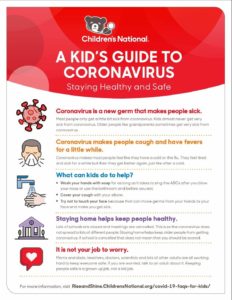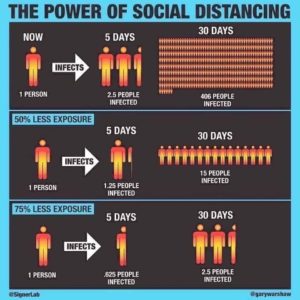This page provides up-to-date information regarding the Somerset County Health Department’s response to the COVID-19 public health emergency.
covid-19 vaccine information
COVID-19 vaccines are the best way to prevent serious illness due to COVID-19. The vaccine teaches our immune system how to recognize and fight the virus that causes COVID-19.
We are currently offering COVID-19 vaccinations to uninsured and underinsured children only.
Vaccine clinics are held Mondays BY APPOINTMENT ONLY .
To schedule an appointment for a vaccine call 443-523-1700.
what is covid-19?
The novel coronavirus is a respiratory disease. The outbreak was caused by a virus known as the 2019 Novel Coronavirus (COVID-19).
Symptoms include mild to severe respiratory illness with a fever, cough, and difficulty breathing. Information and numbers of confirmed cases changed rapidly.
MARYLAND DEPARTMENT OF HEALTH’S CORONAVIRUS site
what are the symptoms of covid-19?
People with COVID-19 have had a wide range of symptoms reported – ranging from mild symptoms to severe illness. Symptoms may appear 2-14 days after exposure to the virus. Anyone can have mild to severe symptoms. People with these symptoms may have COVID-19:
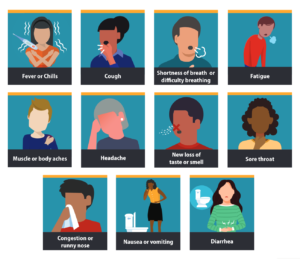
- Fever or chills
- Cough
- Shortness of breath or difficulty breathing
- Fatigue
- Muscle or body aches
- Headache
- New loss of taste or smell
- Sore throat
- Congestion or runny nose
- Nausea or vomiting
- Diarrhea
This list does not include all possible symptoms. CDC will continue to update this list as we learn more about COVID-19.
Older adults and people who have severe underlying medical conditions like heart or lung disease or diabetes seem to be at higher risk for developing more serious complications from COVID-19 illness.
what is the difference between quarantine and
isolation?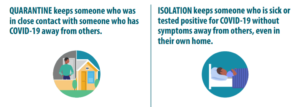
you should quarantine if you were exposed:
- Quarantine and stay away from others when you have been in close contact with someone who has COVID-19.
you should isolate if you test positive or are sick:
- Isolate when you are sick or when you have COVID-19, even if you don’t have symptoms.
what are covid-19 variants?
Viruses constantly change through mutation and sometimes these mutations result in a new variant of the virus. Some variants emerge and disappear while others persist. New variants will continue to emerge. CDC and other public health organizations monitor all variants of the virus that causes COVID-19 in the United States and globally.
What You Need to Know
- New variants of SARS-CoV-2, the virus that causes COVID-19, will continue to occur.
- CDC coordinates collaborative partnerships which continue to fuel the largest viral genomic sequencing effort to date.
- The Omicron variant, which emerged in November 2021, has many lineages. New lineages continue to emerge and spread in the United States and globally.
- For the most up to date information on current variants, visit CDC’s COVID Data Tracker.
covid-19 information for individuals with disabilities:
If you would like more information or assistance regarding COVID-19 for people with intellectual or developmental disabilities, please contact The Somerset County Health Department at 443.523.1700.
a guide for caregivers
COVID-19 is challenging to explain, live through, and communicate about. As a caregiver, you work hard to help the person you care for stay healthy and safe during this difficult time.
tips for talking about covid-19
Model and explain what you’re doing to stay safe. When you take steps like wearing a mask or washing your hands, try pointing out and talking about what you’re doing. For example, as you’re putting your mask on, say “I’m putting my mask on now before I go outside.”
Show empathy by acknowledging the hard things. Some ways to prevent COVID-19 like wearing a mask and getting a vaccine, can be hard — especially for people with sensory challenges. Show that you understand what they’re going through. Then remind them that everyone needs to take steps to stay safe from COVID-19. When possible, see if there are small changes that could make it easier – for example, trying out a different style of masks.
Give safe distance reminders. When you’re getting ready to leave home, remind the person you care for to keep a safe distance (until a few weeks after their last COVID-19 shot). Be sure to use the same words every time. For example, you could say, “When we go out, keep a safe distance between yourself and other people.”
Identify and acknowledge changes in routine. When COVID-19 interrupts your plans or routines, clearly acknowledge what’s changing and explain why. For example: “We can’t go out to dinner with Uncle Marcus right now. I know you miss hanging out with him, but it’s not safe because of COVID-19.” If possible, suggest a safer alternative like a video call.
Explain what to expect ahead of time. When you’re getting ready to go to a new place, explain what to expect and point out anything that might be different than usual because of COVID-19. For example, as you’re getting ready for a doctor’s appointment, you could mention that everyone will keep a safe distance in the waiting room, and the doctor will also wear a mask. Social stories can be a great way to prepare for new situations like these.
Ease their worries. It’s normal to feel scared or anxious about COVID-19 — especially when there’s so much that is out of our control. If the person you care for is feeling worried, remind them that there are things they can do to stay safe: get a COVID-19 shot, wear a mask, and keep a safe distance until 2 weeks after their last shot, and wash their hands.
for those who are deaf or hard of hearing:
Click here to see the full list of American Sign Language videos regarding COVID-19.
face coverings/masks:
Use and Care of Masks
Wear a mask with the best fit, protection, and comfort for you
Where can I find a face covering? Most stores are now selling pre-made face masks. You can also look for a bandanna or a scarf that will cover both nose and mouth.
Do I need more than one covering? It’s a good idea as they must be cleaned daily.
How frequently do I need to clean a face covering? Every day. Wash your covering in warm to hot water with soap.
Can I share my face covering? No. Everyone should have their own to limit the exchange of germs and stop the spread of infection.
children and covid-19:
Talking to Young Children about CoronaVirus
Managing TEEN ANXIETY
mental health and covid-19:
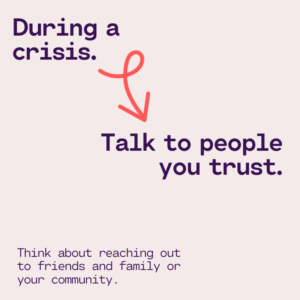
FREQUENTLY ASKED QUESTIONS ABOUT MENTAL HEALTH FOR ALL AGES
MANAGING FEARS ABOUT THE CORONAVIRUS
psychological first responder self-care health tips
substance abuse and covid-19:
resources for on-line access for families and individuals dealing with substance abuse disorders
- Narcotics Anonymous, or http://virtual-na.org, or http://NAbyphone.com
- Alcoholics Anonymous
- Recovery dharma
- SMART Recovery
- Celebrate Recovery
SAMHSA has also added a COVID-19 website which has several guidance documents and resources pertinent to treatment and recovery. https://www.samhsa.
environmental health and covid-19:
COVID-19 Food Safety guidelines FOR HOME AND BUSINESS
COVID19 and Septic Systems – What to Know
pets and covid-19:
- The risk of animals spreading COVID-19 to people is low.
- The virus can spread from people to animals during close contact.
- More studies are needed to understand if and how different animals could be affected by COVID-19.
- People with suspected or confirmed COVID-19 should avoid contact with animals, including pets, livestock, and wildlife.
For more information about animals and COVID-19, click here.
cdc fact sheets:
What can the public do?
stop the spread
handwashing 101
spanish covid-19 information:
Lo que necesita saber sobre la enfermedad del coronavirus
SÍNTOMAS DE LA ENFERMEDAD DEL CORONAVIRUS
Los Microbios están por todos lados
MANTENGA LA CALMA Y LÁVESE LAS MANOS
Qué hacer si contrae la enfermedad del coronavirus
DETENGA LA PROPAGACIÓN DE LOS MICROBIOS
get involved:


